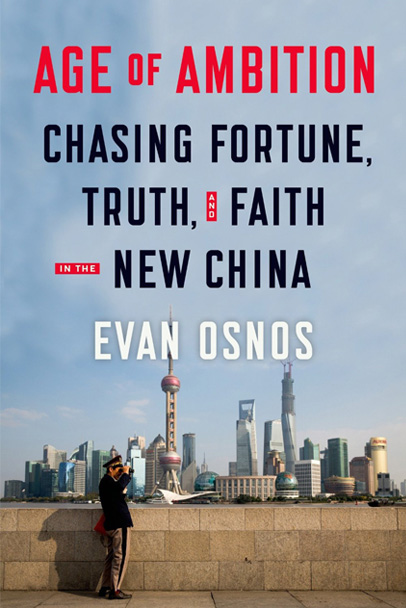
Book review: Age of Ambition: Chasing Fortune, Truth and Faith in the New China. By Evan Osnos. Farrar, Straus & Giroux; 417 pages. R$36,14 (ebook, www.amazon.com.br)
Published in the Journal of Third World Studies. Volume: 32. Issue: 2 Publication date: Fall 2015. Page number: 271.
China, like any other non-democratic regime, poses a fundamental dilemma to scholars: How to be truthful without losing access to valuable sources in the Chinese government, academia and civil society. This is particularly important for those who have set their career on studying China. Mastering the Chinese language is a multiple-year effort, yet those who turn into personae non grata will find it difficult to conduct field research, find positions as visiting faculty at Chinese universities, or interview Chinese policy makers. Most scholars are therefore cautious not to cross the ‘invisible line.’
International correspondents who leave China after working there for years are, by contrast, in a privileged position; they no longer depend on the Chinese government’s goodwill and are in a position to write an honest account about their time in the world’s most populous nation. And indeed, Evan Osnos’ Age of Ambition is remarkably candid about corruption, oppression and struggle in China. Certainly, his chapters about systemic corruption on an absurd scale and waste of public resources are by far the most interesting part of the book.
The main narrative in Osnos’ book is the transformation from collectivism to individualism in Chinese society. The swiftness of this change is dizzying and has made China, in many ways, far more individualistic and materialistic than many Western societies. Personal ambition is more explicit, and Osnos compares today’s China to late nineteenth century America, when robber barons ruled an increasingly unequal and exploitative economy. The sense of urgency seems omnipresent. The author cites a Chinese tourist in Europe who marvels at a car that stops at a crosswalk. Drivers in China think “I can’t pause. Otherwise, I’ll never get anywhere.” The Chinese word for ambition, ye xin, literally means “wild heart” and it has only recently shed its negative connotation. After all, open personal ambition, under the dark days of Mao, was considered undesirable.
Yet while the examples the provided are colorful, the overall impression they create is somewhat caricaturesque and makes the Chinese seem almost mindlessly active, and almost nonhuman. For example, Osnos writes that sex was so taboo in the early 20th century that some couples struggled to have children “because they lacked a firm grasp of the mechanics.” That is hardly plausible and makes the uninformed reader think of the Chinese as easily controllable robotic creatures. There is plenty of evidence of liberal mores both before and during Mao’s rule. In the same way, the author seems to relish listing weird book titles that are popular in China — yet a reciting the titles of cheap books sold at gas stations in rural parts of the United States or Europe would sound equally bizarre. In that way, and many others, China is more like the rest of us than Age of Ambitions seems to suggest.
The book’s engaging style makes it an ideal introduction for those who have little previous knowledge of China. Those who know the country are likely to be somewhat disappointed, as Osnos spends much time dwelling on famous individuals, like Chen Guangcheng, whose trajectories are well-known to most China watchers. Also, regular readers of the New Yorker will recognize several sections, such as a chapter about Chinese tourists in Europe, or about a national outcry after a child was run over and nobody bothered to help.
Osnos emphasizes the tension between China’s recent obsession with individualism and the desire to find a voice on the one hand, and government repression on the other. Children recite sentences like “I am unique” and “I am the greatest miracle of nature” in school, yet citizens can neither vote nor freely express themselves. One can tell how much the author enjoyed living in China — he speaks Mandarin fluently and preferred living in a run-down apartment in a poorer part of Beijing rather than a quiet high-rise that provided little access to common citizens. Yet his overall judgement is unequivocal — to his mind, the Chinese government is morally bankrupt. At the anniversary of the Tiananmen Square demonstrations, people had been discussing the topic, in code, calling it “the truth” — zhenxiang. The censors picked up on it, and when people searched Weibo for anything on the topic, they received an emblematic warning: “In accordance with relevant laws, regulations and policies, search results for ‘the truth’ have not been displayed.”
In addition to writing about torture, government censorship and hypocrisy (common citizens being publicly humiliated for adultery, while many party officials entertain mistresses and prostitutes), he details how the Communist Party no longer promotes the best and the brightest to top positions — long seen as the seal of legitimacy. All this implicitly lends Age of Ambition a pre-revolutionary atmosphere. And yet, the Communist Party has so far held the upper hand, against all odds. As the Global Times, a party tabloid, asserts, “For 30 years Ai Weiweis have emerged and fallen… the real social trend is that they will be eliminated.”
Read also:
The Concubine Who Launched Modern China
The myth of inward-looking China
Book review: “The Boxer Rebellion and the Great Game in China” by David J. Silbey








